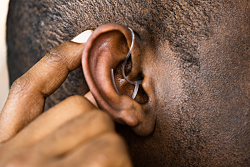Clearing up confusion about over-the-counter hearing aids

In October, the Food and Drug Administration’s ruling on over-the-counter hearing aids for mild to moderate hearing loss went into effect. For the first time, hearing aids can now be purchased directly by consumers online and at retail stores without a prescription.
The goal is to lower cost and improve access to the devices, but with several different options available at various price points, it can be difficult for consumers to make a choice. Sterling Sheffield, Au.D., Ph.D., an audiologist and assistant professor in the department of speech, language, and hearing sciences at the University of Florida College of Public Health and Health Professions, has conducted research comparing the performance of over-the-counter hearing aids to prescription devices and on the economic burden of hearing aids on patients. He offers advice on navigating the new market.
Question: What is the significance of the FDA’s ruling?
Answer: We know that only about 20-30% of people who could benefit from hearing aids have ever purchased or used them and that percentage has not changed since 1980, despite many important advances in the technology. We hope this ruling opens the door for much greater access to hearing aids for people who need them and helps to address hearing health disparities, particularly among minority groups.
Q: What are signs that someone may need hearing aids?
A: The best way to determine when it might be time to get hearing aids is to consider the impact hearing loss has on your life, whether it be at work, in social situations, with your family or even in your home. If you struggle to hear in any of those situations, then you should seek help.
Q: Do you need to see a hearing professional before buying hearing aids?
A: The new FDA ruling makes it possible for consumers to buy hearing aids without seeing a health care provider, but ideally anyone experiencing hearing loss should see a hearing professional. These direct-to-consumer hearing aids are designed for people with mild to moderate hearing loss and will not provide sufficient benefit for people with more extensive hearing loss. An audiologist or other hearing professional can diagnose your level of hearing loss and provide guidance on the type of hearing aids that are most appropriate for you.
We know that because of geographic location or other life situations, it may be difficult for some people to see a hearing health professional. So if you can’t see someone, I don’t think that should inhibit you from trying to address hearing loss by purchasing hearing aids.
There are some medical conditions in which over-the-counter hearing aids will likely not help, and you do need to seek medical help. These include a sudden loss of hearing. Also, if you have constant ringing or buzzing in your ears, particularly if it’s only in one ear, hearing loss in one ear only, pain in one or both ears, fluid or pus draining from either ear recently, vertigo or significant dizziness, you should see a professional.
Q: What advice do you have for someone who is ready to buy hearing aids off the shelf?
A: There are several factors to consider and a lot of options that can make the process difficult. First, we know that among new hearing aid users there is a learning curve for getting the right fit, knowing how to insert them and how to maintain them. When choosing over-the-counter hearing aids, make sure the company you’re buying from offers good customer support or you have another source of support, such as a hearing professional. You should also consider the return policy and warranty on the hearing aids, which can be shorter than prescription hearing aids.
Another thing to consider is how much control you want to have with your hearing aids and how comfortable you are with technology. With some hearing aids, the only setting you can change is the volume. Others employ apps that allow you to change settings, including amplifying high versus low pitches or setting programs for specific hearing situations, such as restaurants or enjoying music at home. Some hearing aids will connect to your phone with Bluetooth for both streaming media and using your phone. Others do not offer such features.
With regard to price, our research has shown that the price of the hearing aids doesn’t necessarily predict the best device. We tested several devices between the range of about $400 to $1,500, and there was no correlation of price with quality.
The National Institute on Deafness and Other Communication Disorders and the National Council on Aging websites provide helpful information on hearing aid options and considerations. And hearing health professionals can offer recommendations on specific devices. We’re here to help everyone hear better in their daily environment.
Q: Why is it important to not delay getting hearing aids if you need them?
A: Previous research has demonstrated that hearing loss increases your risk of developing dementia. What we don’t have evidence of yet is if the use of hearing aids lessens that risk or reverses it. But we do know that people with untreated hearing loss tend to limit their interactions with the outside world, which can have a detrimental effect on cognitive health. Getting treatment for your hearing loss will help you engage more effectively and more regularly with the people around you.
Media contact: Jill Pease, jpease@phhp.ufl.edu, 352-273-5816
About the author
